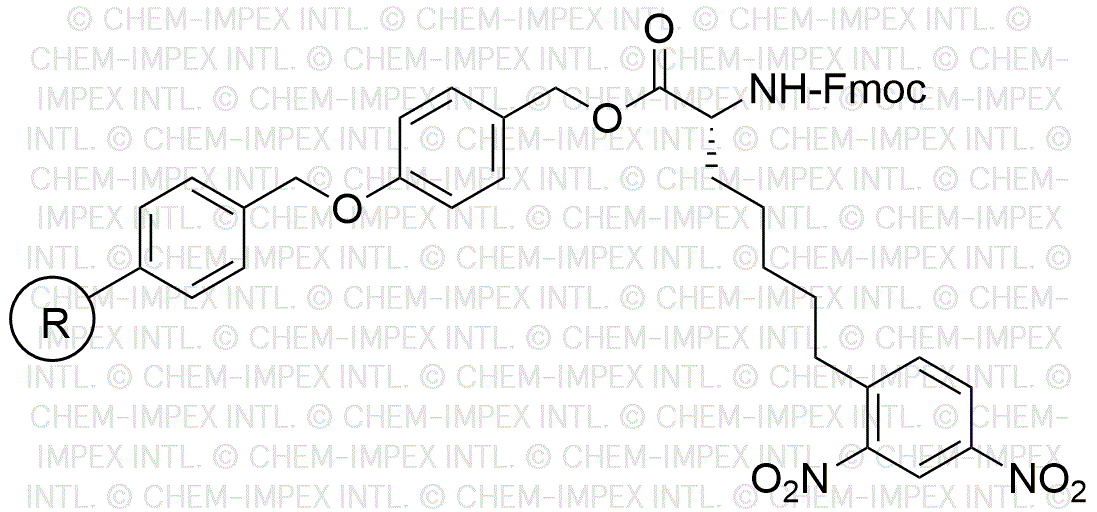Na-Fmoc-Ne-2,4-dinitrophenyl-D-lysine 4-alkoxybenzyl alcohol resin is widely utilized in research focused on:
- Peptide Synthesis: This resin serves as a solid support in the synthesis of peptides, allowing for efficient coupling and deprotection reactions, which are essential in the production of custom peptides for pharmaceuticals.
- Drug Development: It plays a crucial role in the development of new drugs by facilitating the creation of peptide-based therapeutics, which can target specific biological pathways.
- Bioconjugation: The resin can be used to attach various biomolecules, such as antibodies or enzymes, to peptides, enhancing their functionality for diagnostic and therapeutic applications.
- Research in Immunology: It aids in the study of immune responses by enabling the synthesis of peptide antigens that can be used in vaccine development or immune profiling.
- Material Science: This compound is also explored in the development of novel materials with specific properties, leveraging its unique chemical structure for applications in nanotechnology and biosensors.
General Information
Properties
Safety and Regulations
Applications
Na-Fmoc-Ne-2,4-dinitrophenyl-D-lysine 4-alkoxybenzyl alcohol resin is widely utilized in research focused on:
- Peptide Synthesis: This resin serves as a solid support in the synthesis of peptides, allowing for efficient coupling and deprotection reactions, which are essential in the production of custom peptides for pharmaceuticals.
- Drug Development: It plays a crucial role in the development of new drugs by facilitating the creation of peptide-based therapeutics, which can target specific biological pathways.
- Bioconjugation: The resin can be used to attach various biomolecules, such as antibodies or enzymes, to peptides, enhancing their functionality for diagnostic and therapeutic applications.
- Research in Immunology: It aids in the study of immune responses by enabling the synthesis of peptide antigens that can be used in vaccine development or immune profiling.
- Material Science: This compound is also explored in the development of novel materials with specific properties, leveraging its unique chemical structure for applications in nanotechnology and biosensors.
Documents
Safety Data Sheets (SDS)
The SDS provides comprehensive safety information on handling, storage, and disposal of the product.
Product Specification (PS)
The PS provides a comprehensive breakdown of the product’s properties, including chemical composition, physical state, purity, and storage requirements. It also details acceptable quality ranges and the product's intended applications.
Certificates of Analysis (COA)
Search for Certificates of Analysis (COA) by entering the products Lot Number. Lot and Batch Numbers can be found on a product’s label following the words ‘Lot’ or ‘Batch’.
*Catalog Number
*Lot Number
Certificates Of Origin (COO)
This COO confirms the country where the product was manufactured, and also details the materials and components used in it and whether it is derived from natural, synthetic, or other specific sources. This certificate may be required for customs, trade, and regulatory compliance.
*Catalog Number
*Lot Number
Safety Data Sheets (SDS)
The SDS provides comprehensive safety information on handling, storage, and disposal of the product.
DownloadProduct Specification (PS)
The PS provides a comprehensive breakdown of the product’s properties, including chemical composition, physical state, purity, and storage requirements. It also details acceptable quality ranges and the product's intended applications.
DownloadCertificates of Analysis (COA)
Search for Certificates of Analysis (COA) by entering the products Lot Number. Lot and Batch Numbers can be found on a product’s label following the words ‘Lot’ or ‘Batch’.
*Catalog Number
*Lot Number
Certificates Of Origin (COO)
This COO confirms the country where the product was manufactured, and also details the materials and components used in it and whether it is derived from natural, synthetic, or other specific sources. This certificate may be required for customs, trade, and regulatory compliance.


